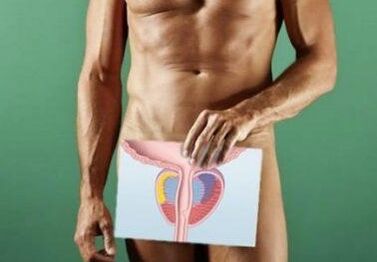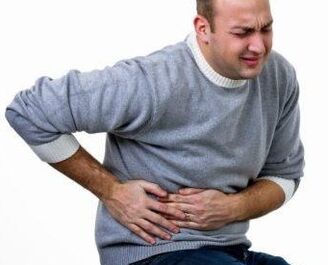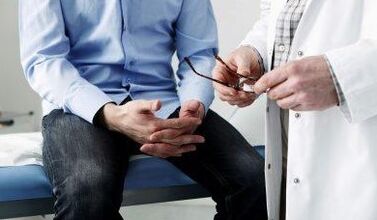Inflammation of the prostate gland is a serious disease that can lead to serious consequences if it is not treated.The prostate is located under the bladder.
When it is inflamed, it increases significantly in size, blocking the bladder neck and interfering with the outflow of the urine.Therefore, with the first symptoms and events, it is necessary to immediately contact a specialist to identify and start the treatment of prostatitis.

The main symptoms: how does prostatitis manifest itself?
Previously it was believed that this was a disease of adults and elderly men, but in modern living conditions (ecology, quality of food, fashion, a negligent attitude of youth for their health, constant movement for cars, etc.), inflammation of the prostate gland is significantly "younger".
The incidence of young people under the age of 18 is 5%, from 18 to 30 years - 45%, from 30 to 50 years - 20%, over 50 years - 30%.This suggests that it is necessary to follow male health and listen to young symptoms.
There are different types of prostatitis in the form of a manifestation (chronic, acute) and the type of inflammation (bacterial, stagnant, purulent, infectious, calculose).The symptoms of the disease can be different, depending on the type of inflammation of the prostate gland in men.
Symptoms of acute prostatitis:
- Poor well (weakness, chills, fever).A person can start throwing on fire or cold.General symptoms resemble the event of Sar or influence;
- A strong increase in body temperature to the sign of subfubrils (37.5-38 degrees) and superior;
- serious cutting pains, seams in the perineum (groin area, anus, etc.);
- Back pain, sides, leg donations, knees, feet or leg muscles;
- acute pain that appears during the defecation act and keeping you;
- Problems with urination (insufficient / frequent urination, painful or difficult to urinate).Urine delay for a long period of time (more than 12 hours);
- deterioration of sexual function (weak or complete absence of erection, ejaculation, problems with conception);
- exhaust from the genitals (in the most serious and advanced cases of prostatitis).
Symptoms of chronic prostatitis:
- urination problems (difficult urination, pain, insufficient urine, sense of incomplete emptying of the bladder, etc.);
- Unpleasant pains and sensations in the horse, between the legs, to the groin, in the anus.Pain syndrome is not pronounced;
- In the groin, sometimes a severe pain or a strong burning sensation can occur, transforming into the horse;
- General malaise for a long period (sleepiness, apathy, depressive state, constant fatigue, muscle weakness, etc.);
- nervousness, irritability;
- A slight increase in body temperature.Sometimes a subfebral temperature can remain for a long time;
- decrease in sexual function (erection problems, decrease or lack of ejaculation, decrease in libido, infertility, etc.).

The chronic course of prostatitis involves periods such as remission and relapse.During the impact, the symptoms of a chronic form can develop in symptoms of an acute form of the disease.
Bacterial symptoms:
- Signs of the inflammatory process (heat, fever, fever, general weakness, pain syndrome in muscles and bones);
- Signs of local inflammation of the prostate (pain in the perineum, groin, anus);
- problematic urination;
- Change the consistency, color and smell of liquids (urine, the secret of the prostate, sperm, blood).
Calculation symptoms:
- Weak and moderate pain syndrome in the lower back, sacral section, horse, anus;
- pull pain and burn in the perineum, groin;
- Pain intensifies significantly after the relationship and during the active movement;
- Problems with urination, a sense of outbreak of the bladder;
- decrease in libido, problems of ejaculation and erection (up to erectile dysfunction);
- In advanced cases, blood drops can appear in sperm (it becomes light pink or bright red).
Symptoms of the stagnant form:
- Unpleasant sensations in the area of the groin, horse and anus;
- Periodic traction pains in the perineum;
- problematic urination, a feeling is not completely inanis of the bladder;
- constant increase in temperature to the subfebric sign;
- Manifestations of the general inflammatory process in the body (increase of ESR, malaise, sleepiness, fatigue, headache, weakness, muscle pain, etc.);
- Problems in the genital area (weak ejaculation and erection, infertility);
- Nerve conditions, depressive state, apathy.
Symptoms of an infectious form:
- Signs of inflammation in the body (increase in the value of the ESR in the blood of a man, muscle pain, fever);
- Painful pain in the lower back, groin and perineum;
- pain during defecation;
- acute pains in groin and perineum;
- Problems with urination (difficult, rapid urination, lack of impulse, etc.).
Purulent symptoms:
- a strong strong increase in body temperature (above 38, 5 degrees);
- Signs of the inflammatory process in the body (high value of ESR, muscle pain, heat, chills, etc.);
- Pain syndrome pronounced in the groin, perineum and anus;
- acute pain in the perineum;
- Difficult urization, painful urination;
- Purulent discharge from the genitals.
What are the first signs of men?
With the initial inflammation of the prostate in a man, only a part of the symptoms of the disease can occur.Signs of the beginning inflammation of the prostate, which must pay particular attention to:

- Unpleasant sensations in the perineum;
- Periodic (weak traction pain in the groin and perineum;
- pull unpleasant sensations in the anus and intestine during defecation (in the absence of hemorrhoids);
- Long -term malaise general, unrelated to Sars, tonsillitis, influence and other colds;
- decrease in libido, malfunctions during ejaculation and erection (its periodic absence);
- decrease in the quality of orgasm;
- Unpleasant sensations in the urethra and groin during sex or after sexual intercourse;
- change of consistency, color and smell of sperm;
- Improve body temperature.
Expressed signs of acute prostatitis:
- an increase in temperature at 37.5-40 degrees without an apparent reason (not a cold, not an influence, not angina);
- The urination frequency increases by 3-4 times and is accompanied by acute pain.The urine flows slowly and with weak pressure;
- Burn to the groin, perineum and during defecation.Pain in the intestine during the defecation act;
- Pus exhaust from the intestine or urethra (with severe route and purulent form of the disease).
Signs pronounced of chronic prostate inflammation:
- Burn to the groin and perineum.Burn in the genitals (especially when urinating and sex);
- Purulent discharge from the urethra after urination and when it strives (active movements or defecation).Purulent discharge from the rectum;
- nervousness, depressive states, irritability;
- Quick fatigue without apparent reason, sleepiness.
Pain syndrome for inflammation of the prostate gland
Almost always, with the inflammation of the prostate gland, a man can discover the causes of pain syndrome from his character.The characteristic pains that pull, sore or acute appear in the horse and groin.In acute form or with the impact of the chronic form of pain, the pain is characterized as acute, acute, painful, cut and pulling.In the chronic form of the disease, the pain is periodic, similar to the wave.In addition, pain syndrome can be weak, but constant.The inflamed prostate gland presses on the urethra, on the neck of the bladder and its ureters.It is on these channels that the urine comes out of the bladder, from which pain may appear during urination.In addition, pain during urination can be a sign of bladder infections or parental parent system (sexual transmission diseases).
Accompaniment pains can have a completely different cause of occurrence.Just like the presence of several pains that accompany prostatitis may not be inflammation of the prostate gland at all, but from a set of other diseases.
Other causes of accompanying pain:
- Abdominal pain is a symptom of many other diseases.A surprising example is appendicitis, acute poisoning, intestinal or interreligious infection.
- The lower part of the back can hurt due to hernia, osteochondrosis, pinch of nerve endings, osteoporosis, scattered sclerosis and other diseases of the spine.
- Pain in the anus can occur due to hemorrhoids, cracks, bruises, a long seat on an uncomfortable solid surface and various neoplasms (benign or malignant).
- Sacral spine pain syndrome is more serious.Very often these are problems with bones, vertebrae and discs (osteochondrosis, osteoporosis, movement, pinch, etc.).

Sometimes pain in the sacred means problems with other internal organs (kidneys, intestines, bladder and ureters), gynecological diseases, thromboflebitis, inflammation of the pelvic organs.
- The pain of the legs can mean a manifestation of flat feet, thrombopholebitis, atherosclerosis, varicose, arthritis, osteoporosis, inflammation of the sciatic nerve and even diabetes.Leg pain can have many different reasons.
The most common is the effort of the legs and muscles from prolonged physical activity.
Which specialist is engaged in the treatment of the disease?
In the patient, only a qualified doctor, a urologist is diagnosed in the patient.It collects an anamnesis and examines the patient.Then he directs the man for the tests (psa-antigen-prototine to detect prostatitis) and an ultrasound of the pelvic organs.
In addition, the patient without failure passes general tests of blood and urine.Based on the results of all analyzes, the urologist can accurately determine the diagnosis and form of inflammation of the prostate gland.Only after these procedures can the doctor prescribe an individual course treatment, including drugs, antibiotics and other drugs that usually take houses.
A man in 95% of cases knows exactly what diagnosis will make the urologist, because the pain for inflammation of the prostate is very specific.It is necessary to constantly listen to your body, monitor all the changes that occur with the body.This is the only way in which a man can maintain his male health for many years.The neglected prostatitis threatens not only a urination disorder, but also with problems with libido, ejaculation, an erection, which in the end can lead to indefertility.













